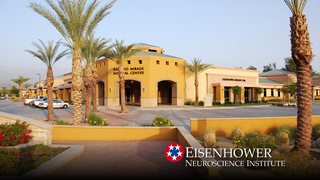Conditions
- Cancer and Benign Tumors
When it comes to benign tumors of the spine and brain, even non-cancerous tumors can cause life-threatening complications if they are not treated. Spine tumors cause spinal cord compression, pain, and neurological problems while brain tumors exert pressure on the brain, compressing tissue as they grow. In addition to tumors of the spine and brain, our neurologists treat tumors of the pituitary gland, which is located at the base of the brain, and skull-base tumors, located at the bottom of the skull.
- Cerebrolvascular Disease and Stroke
Eisenhower Neuroscience Institute’s Neurovascular Team diagnoses, treats, and provides ongoing management for cerebrovascular diseases. Cerebrovascular disease refers to conditions that affect blood vessels and circulation in the brain. Problems with blood flow occur due to: Stenosis, when blood vessels narrow, restricting blood flow. Thrombosis, the formation of a thrombus, or blood clot, in a blood vessel that reduces blood flow. Embolism, the blockage of a major artery by a blood clot, air bubble, speck of body fat, or other substance becomes stuck in a blood vessel and obstructs blood flow. Hemorrhage, the rupture of a blood vessel, causing bleeding in the brain.
- Movement Disorders
The term movement disorders refers to a group of neurological conditions that cause abnormal movement. Depending on the specific disorder, movement may be abnormally rapid, slowed down, or involuntary. Movement disorders may stem from natural causes, such as genetics, metabolic issues, vascular disease, or stroke. These disorders may also be due to an infection, exposure to toxins, side effects of a medicine, or damage to the brain, spinal cord, or peripheral nerves.
- Neurocognitive Disorders
Eisenhower Neuroscience Institute is the only spine care program in the valley with the specialists and technologies to offer comprehensive spine care. Our accomplished, board-certified surgeons and neurosurgeons provide state-of-the art prevention, diagnosis, treatment, and surgical intervention for a variety of spinal diseases and injuries.
- Neuromuscular Disorders
Neuromuscular disorders affect the nerves that connect the muscles to the spinal cord and brain. Some of these nerves control the voluntary movement of the muscles while others communicate sensory information back to the brain. When these nerves become dysfunctional or die, communication breaks down between the muscles and the brain and the muscles begin to atrophy. Some neuromuscular diseases are hereditary or caused by a spontaneous mutation. Others are caused by an immune system disorder.
- Neurotology
Neurotology is a subspecialty that combines otolaryngology (ear, nose, and throat) and neurology. The focus is on treatment and surgery for neurological diseases of the ear and skull base, including hearing and balance disorders and conditions affecting the ear, auditory nerves, and related neural pathways in the brain.
- Spinal Disease and Injuries
Our accomplished, board-certified surgeons and neurosurgeons provide state-of-the art prevention, diagnosis, treatment, and surgical intervention for a variety of spinal diseases and injuries.





